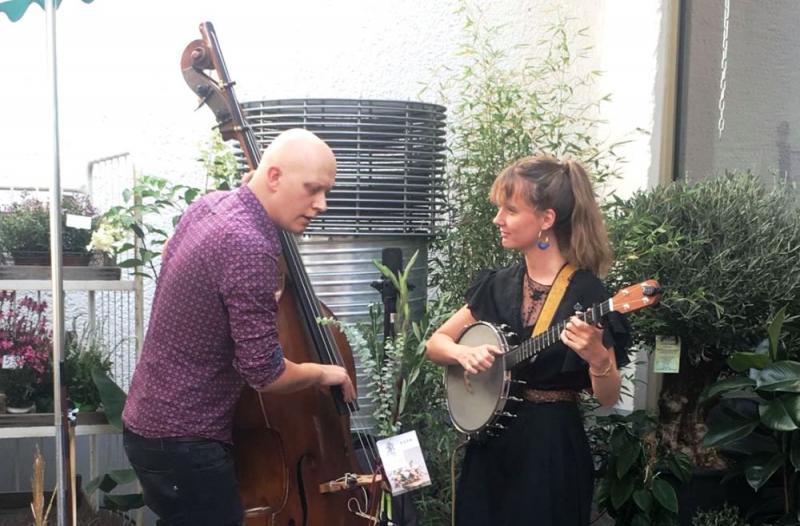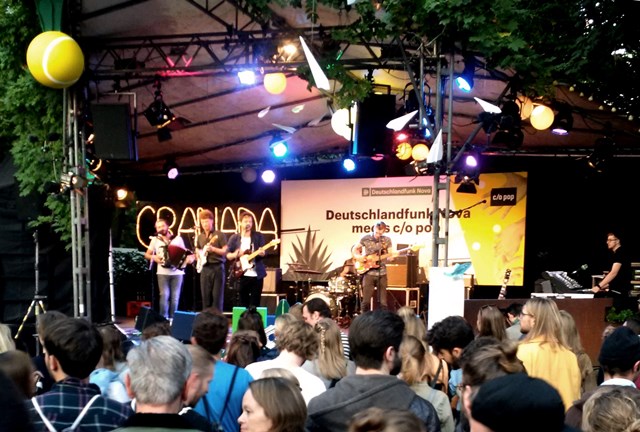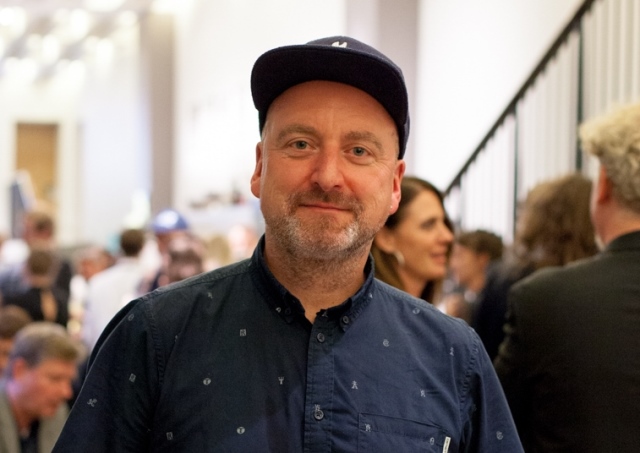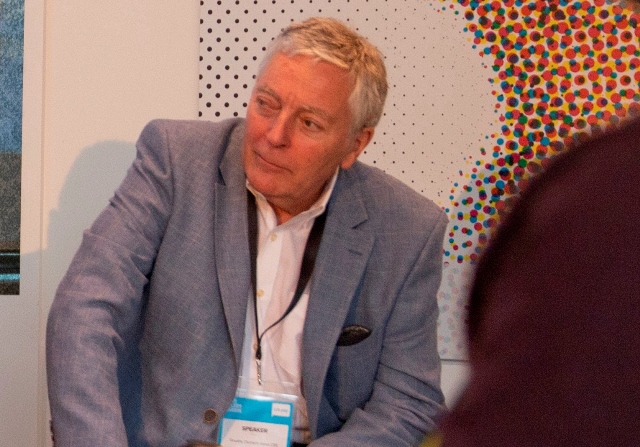theartsdesk in Cologne: urban boutique on the Rhine | reviews, news & interviews
theartsdesk in Cologne: urban boutique on the Rhine
theartsdesk in Cologne: urban boutique on the Rhine
c/o Pop festival clouded by uncertainties about Britain’s departure from the EU

The terrace beside the restaurant in Cologne’s Stadtgarten – the city park – is heaving. Agreeably so. A bar and a food counter facing onto it are fringed by rows of long tables. Overhanging trees unite in a canopy suggesting this might be forest clearing.
On the terrace’s bandstand, Tigger-ish Berlin band Champyons bounce through a mix of electro-inclined pop and guitar-focused songs suggesting a punked-up Dodgy (pictured below right). The eccentric inclusion of an accordion in their line-up is no obstacle to the fun. Beneath the restaurant, in the basement bar Studio 672, the winsome Bavarian duo Bruckner thrill an excited, mostly female, audience. Across the road, Club Z thuds to the synth-coloured math rock-ish stylings of Essen’s Dote.
 Stretching south along Brüsseler Str., the surrounding area embraces the upbeat spirit. Squished against the shelves of the bookshop Stiebter Himmel and hemmed in by keyboards and pedals, Dissolver is a one-man Medicine. The clothes shop Blutsgeschwister is hosting Soeckers, a sort-of Arctic Monkeys. Best of all, and taking it back to the Stadtgarten terrace’s bucolia, outside a market hall the local but half-New Zealand bluegrass-influenced duo Stereo Naked sing off-the-wall songs of road kill and thwarted ambition amongst a flower stand’s plants.
Stretching south along Brüsseler Str., the surrounding area embraces the upbeat spirit. Squished against the shelves of the bookshop Stiebter Himmel and hemmed in by keyboards and pedals, Dissolver is a one-man Medicine. The clothes shop Blutsgeschwister is hosting Soeckers, a sort-of Arctic Monkeys. Best of all, and taking it back to the Stadtgarten terrace’s bucolia, outside a market hall the local but half-New Zealand bluegrass-influenced duo Stereo Naked sing off-the-wall songs of road kill and thwarted ambition amongst a flower stand’s plants.
This is c/o Pop, a four-day festival of music from Germany and elsewhere which is now in its 15th year. After expanding the handle to Cologne on Pop, its purpose becomes clear. “c/o Pop is an urban boutique event,” explains Ralph Christoff (pictured below left), head of the festival’s strategy and its convention programme. “With a few exceptions, the venue size isn’t more than 500. We consider ourselves to be the main hub for German new talent, to present it to international delegates, people from the different sectors of the music business – that’s the business part. The pure festival part is the same new talent, for an audience mostly from our region, close to the Dutch border and the Belgian border. But people travel from Berlin, Hamburg, elsewhere in Germany too.”
 For a Brit abroad, no matter how great the musical discoveries there’s a nagging thought that if one of these bands did seem a goer for the UK, would they see any point in giving it a go? Britain’s departure from the European Union is accompanied by doubts about any future arrangements – a twin-track hazard.
For a Brit abroad, no matter how great the musical discoveries there’s a nagging thought that if one of these bands did seem a goer for the UK, would they see any point in giving it a go? Britain’s departure from the European Union is accompanied by doubts about any future arrangements – a twin-track hazard.
Amongst c/o Pop’s attendees is the German-born Nina Radojewski, who works as a composer-singer but also has a day job with AIM, the British company representing independent music organisations. She knows about crossing borders
Nina says she moved to the UK due to it “being connected to Europe as well as the US, and the Commonwealth countries – it has a bigger network than Germany. Really worrying is that in the UK we may not be able to take full advantage of the European single market, and the uncertainty about the movement of people is also really worrying – losing the ability for artists to tour and develop their foundations. Up-and-coming independent acts are going to have a problem. I hold a German passport, but I’m aware that it may not be possible for British artists to move forward – the possibility of needing a visa, and how expensive that may be. The costs are going to add up. No one knows what is going to happen and no one can tell you if there is an agreement what it is going to look like. It might not be feasible for me to work in the UK any more.”
That’s the effect of the European Union – easy travelling, easy working, easy to make money
There is, though, a sense that continental Europe is moving on; accepting the UK’s choice and not cluttering its collective head with related anxieties. “The good news for us is that only certain types of German music have ever been an export mover in the UK,” continues Ralph. “The European music market has changed over the last decade, it’s not so dominated by the UK. There is a very strong French music market. Eastern Europe too. Sometimes you find a gateway when a French band is, say, popular in Estonia. There is a strong presence of non-UK music which gives German bands the opportunity to be successful in markets other than the UK. That’s the effect of the European Union – easy travelling, easy working, easy to make money.”
With this appraisal firmly lodged in the bonce, it’s hard not to wonder what a fantastic-as-such band like Essen’s International Music might miss out on if the British market becomes less easy to access. Of course, they will find audiences wherever they play but the UK feels a good fit for them as their approach takes “Pink Flag” (the song, not the album) by Britain’s Wire and runs with it to the nth degree. Concomitantly, our opportunities to enjoy them may be reduced too.
 It’s not just Germans flying their musical kites at c/o Pop. The pick of the outlanders are Please The Trees (pictured right), a terrific and terrifically bizarre trio from the Czech Republic who marry American Music Club’s desolation with an early Spacemen 3 heft. The Netherlands’ The Homesick aren’t as extreme, but their spindly post-punk atmospherics have won them interest from America’s Sub Pop label. A more subdued but contrastingly moving performance was given by Sweden’s Albert af Ekenstam, whose modal songs hint at affinities with the golden, late-Sixties era of Elektra Records.
It’s not just Germans flying their musical kites at c/o Pop. The pick of the outlanders are Please The Trees (pictured right), a terrific and terrifically bizarre trio from the Czech Republic who marry American Music Club’s desolation with an early Spacemen 3 heft. The Netherlands’ The Homesick aren’t as extreme, but their spindly post-punk atmospherics have won them interest from America’s Sub Pop label. A more subdued but contrastingly moving performance was given by Sweden’s Albert af Ekenstam, whose modal songs hint at affinities with the golden, late-Sixties era of Elektra Records.
Aptly for af Ekenstam, one of Cologne’s musical children was some-time Elektra signee Nico, who was born in the city 80 years ago and died 30 years ago. The anniversaries are marked by concerts from Nico-simpatico female artists at the design museum MAKK. KÁRYYN, from Los Angeles, was a highlight with her drifting, eerie, operatic compositions with their nods towards the disassociated sensibilities of black-and-white vintage David Lynch. MAKK is also holding a superb in-full exhibition of the surprisingly numerous album sleeves designed by Andy Warhol – did anyone know he began such work in 1949 with an album of the music heard in Eisenstein’s Alexander Nevsky? As well as the concerts, Nico is celebrated by a special section of the exhibition and, more informally, in the less lofty surroundings of the congenial brauhaus Päffgen – run by the eponymous brewing dynasty of which she was part.
Nico was a free spirit, and the notion returns – if borders become less easy to cross, will EU citizens bother exporting their art to the UK? Before she hooked up with Warhol and the Velvet Underground, Nico was in Britain in 1965 and issued a single on Rolling Stones’ manager Andrew Loog Oldham's Immediate label. Could this happen after Brexit? An opportunity came to put such considerations to another Brit abroad. Lord Timothy Clement-Jones (pictured below left), the Liberal Democrat’s spokesman on the digital economy is also in Cologne, taking part in a discussion on Brexit and its potential implications for the music business.
 Although he is plain-speaking and has an enthusiastic manner, a talk with Tim proved unsurprisingly sobering. “All the impact is happening our side of the Channel,” he declares about Brexit. “We’re the ones who are not going to be able to tour Europe unless there are reciprocal agreements. Club owners may regret not having British acts but they’ll make agreements and find, say, Dutch bands. We are the ones who have shot ourselves in the foot, which is why very very few people in the British music industry are pro Brexit.”
Although he is plain-speaking and has an enthusiastic manner, a talk with Tim proved unsurprisingly sobering. “All the impact is happening our side of the Channel,” he declares about Brexit. “We’re the ones who are not going to be able to tour Europe unless there are reciprocal agreements. Club owners may regret not having British acts but they’ll make agreements and find, say, Dutch bands. We are the ones who have shot ourselves in the foot, which is why very very few people in the British music industry are pro Brexit.”
“There will be a slow attrition,” continues Tim. “We have a fantastic interchange with the EU in all our creative industries. The status quo prevails for the moment but if artists can’t move back and forth easily, London, Liverpool, the rest of the UK, will not be as attractive. Our creative industries will be less attractive. People will move to Berlin, other European cities. It doesn’t mean to say that the Brexiteers are cultural philistines, they might see Klemperer but they don’t understand the implications for our creative industries whether its gaming, broadcasting, film, music. The recent government White Paper does talk about reciprocal rights, so there’s a glimmering that solutions are going to be sought during negotiations. I’m not an optimist about Brexit, but I can see a little tip of a cultural iceberg. I’m hoping that minds will be concentrated as we get closer to Brexit.”
Let’s hope so. There are many things in the world right now which are depressing, many things to worry about and too much needless animosity, negativity and uncertainty, but within this maelstrom do we really need to risk imperilling mutually beneficial cultural exchanges between ourselves, in the UK, and continental Europe? At c/o Pop, aspects of what could be lost in just one cultural sector are brought into sharp focus.
The future of Arts Journalism
You can stop theartsdesk.com closing!
We urgently need financing to survive. Our fundraising drive has thus far raised £49,000 but we need to reach £100,000 or we will be forced to close. Please contribute here: https://gofund.me/c3f6033d
And if you can forward this information to anyone who might assist, we’d be grateful.

Subscribe to theartsdesk.com
Thank you for continuing to read our work on theartsdesk.com. For unlimited access to every article in its entirety, including our archive of more than 15,000 pieces, we're asking for £5 per month or £40 per year. We feel it's a very good deal, and hope you do too.
To take a subscription now simply click here.
And if you're looking for that extra gift for a friend or family member, why not treat them to a theartsdesk.com gift subscription?
more New music
 Album: The Black Keys - No Rain, No Flowers
Ohio rockers' 13th album improves on recent material, but still below mainstream peak
Album: The Black Keys - No Rain, No Flowers
Ohio rockers' 13th album improves on recent material, but still below mainstream peak
 Wilderness Festival 2025 review - seriously delirious escapism
A curated collision of highbrow hedonism, surreal silliness and soulful connection
Wilderness Festival 2025 review - seriously delirious escapism
A curated collision of highbrow hedonism, surreal silliness and soulful connection
 Album: Ethel Cain - Willoughby Tucker, I'll Always Love You
Relatively straightforward songs from the Southern Gothic star - with the emphasis on 'relatively'
Album: Ethel Cain - Willoughby Tucker, I'll Always Love You
Relatively straightforward songs from the Southern Gothic star - with the emphasis on 'relatively'
 Album: Black Honey - Soak
South Coast band return with another set of catchy, confident indie-rockin'
Album: Black Honey - Soak
South Coast band return with another set of catchy, confident indie-rockin'
 Album: Molly Tuttle - So Long Little Miss Sunshine
The US bluegrass queen makes a sally into Swift-tinted pop-country stylings
Album: Molly Tuttle - So Long Little Miss Sunshine
The US bluegrass queen makes a sally into Swift-tinted pop-country stylings
 Music Reissues Weekly: Chip Shop Pop - The Sound of Denmark Street 1970-1975
Saint Etienne's Bob Stanley digs into British studio pop from the early Seventies
Music Reissues Weekly: Chip Shop Pop - The Sound of Denmark Street 1970-1975
Saint Etienne's Bob Stanley digs into British studio pop from the early Seventies
 Album: Mansur Brown - Rihla
Jazz-prog scifi mind movies and personal discipline provide a... complex experience
Album: Mansur Brown - Rihla
Jazz-prog scifi mind movies and personal discipline provide a... complex experience
 Album: Reneé Rapp - Bite Me
Second album from a rising US star is a feast of varied, fruity, forthright pop
Album: Reneé Rapp - Bite Me
Second album from a rising US star is a feast of varied, fruity, forthright pop
 Album: Cian Ducrot - Little Dreaming
Second album for the Irish singer aims for mega mainstream, ends up confused
Album: Cian Ducrot - Little Dreaming
Second album for the Irish singer aims for mega mainstream, ends up confused
 Album: Bonniesongs - Strangest Feeling
Intriguing blend of the abstract, folkiness, grunge and shoegazing from Sydney
Album: Bonniesongs - Strangest Feeling
Intriguing blend of the abstract, folkiness, grunge and shoegazing from Sydney
 Album: Debby Friday - The Starrr of the Queen of Life
Second from Canadian electronic artist and singer offers likeable, varied EDM
Album: Debby Friday - The Starrr of the Queen of Life
Second from Canadian electronic artist and singer offers likeable, varied EDM
 Music Reissues Weekly: The Pale Fountains - The Complete Virgin Years
Liverpool-born, auteur-driven Eighties pop which still sounds fresh
Music Reissues Weekly: The Pale Fountains - The Complete Virgin Years
Liverpool-born, auteur-driven Eighties pop which still sounds fresh
